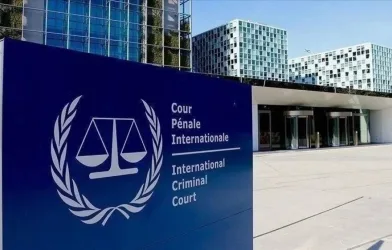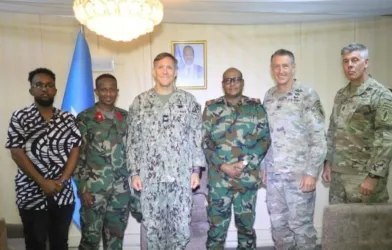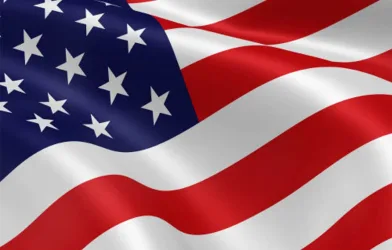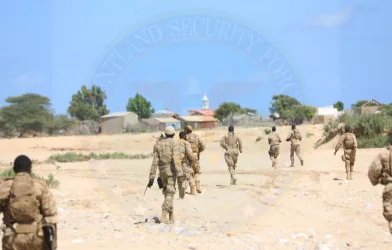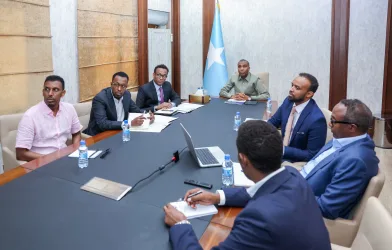
Two months after the Kenyan government moved to suspend 13 Somali remittances operating in its country, the effect of the shutdown has had major impacts on the entire Somali community living in the East African nation.
The ban was condemned by the Somali community in Kenya and human rights advocates. It came days after the militant group launched a deadly raid on Garissa University claiming the lives of 148 people, mostly students.
Many lawyers and Somalis have criticized the move and described it as unfair and based on unfounded accusations.
Mohamoud Jama Hussein is in his final year of his Bachelor studies in a Nairobi University, but he is not sure whether he will able to complete his studies successfully after failing to pay the outstanding balance tuition fees.
‘’My Cousin in Somalia has been paying my tuition fees and responsible for my welfare since I came to Kenya four years ago. Now I cannot receive money from him because there is no an International Banking system in my country,’’ he said.
Since the central government of Somalia was overthrown in 1991, majority of the Somali people have been relying on money sent by relatives and friends living abroad becoming the single most important source of income.
By that time, the Federal government of Somalia called for the Kenyan authorities to reconsider its decision which will have a major impact on the hundred thousands of Somali citizens which majority of them receive bills from abroad via the hawalas.
In the last two decades, a diaspora-fuelled economic boom has transformed Nairobi’s Eastleigh estate into a major East African commercial zone associated primarily with its large Somali population.
 Eastleigh, a small neighborhood in the Kenyan capital of Nairobi, is a place both renowned for its shopping and vibrant economy. With a population approximately 100.000 inhabitants, it represents one of the largest Somali cities, and the second largest contiguous Somali community outside of Somalia itself.
Eastleigh, a small neighborhood in the Kenyan capital of Nairobi, is a place both renowned for its shopping and vibrant economy. With a population approximately 100.000 inhabitants, it represents one of the largest Somali cities, and the second largest contiguous Somali community outside of Somalia itself.
Somali businessmen are saying that business activities in the Suburb area of Eastleigh have faced a major decline. Ahmed Mohamed, a Committee member of the Eastleigh traders union stresses that 20% of the business has dropped ever since.
‘’Remittances were a major boost to our daily businesses. Sending and receiving money from abroad used to contribute to the economy. We have made a research and learnt that 20% of the business has declined due to the ban.
‘’We are afraid that if the ban is not lifted in the near future, the business activities will be in jeopardy and end up collapsing,’’ he said in an interview with the BBC Somali Service.
International humanitarian agencies operating in Somalia have warned the action by Kenya to close the hawalas could significantly affect livelihoods in Somalia whose dependence on remittances has been instrumental in building the country.
Refugees often represent one of the weakest and most vulnerable members of a society. They are conceived of as a unanimous mass, warehoused in refugee camps and more often than not can’t decide upon the context and circumstances of their lives. The physical location is a key factor for this powerlessness. Refugee camps are usually located in remote areas. The distance to a social, cultural or economical context limits the possibilities of refugees and creates a dependency on humanitarian aid.
 Dadaab refugee camp close to the Somalia-Kenya border is the world’s largest camp, sheltering around 500,000 Somali refugees who fled civil war in their country.
Dadaab refugee camp close to the Somalia-Kenya border is the world’s largest camp, sheltering around 500,000 Somali refugees who fled civil war in their country.
Security agencies have regularly accused some of the Somali refugees for habouring suspected members of the Al-Shaabab group.
However, most of the refugees living in the camp relied on money sent from abroad by families, relatives and friends.
‘’My sister in Norway used to send me per month $200 via the hawalas which have offices in Nairobi and transferred and receive from the agents here. For two months we have been living in a hard life and one of my kids is very sick and cannot get good medication in this area,’’ says Omar Abdulle, a father of Six children.
Nurto Sheikh Jimale gave birth a day after the ban was imposed. She says that her baby has been suffering from measles and other illnesses ever since and doctors advised her to take her to a hospital in Garissa to receive the right treatment.
‘’My baby doesn’t sleep day and night. The doctors suggested me to take her to a hospital in Garissa, but I don’t have the amount of money that can take me to Garissa and get the medication needed.’’
The move by Kenya comes in the wake of similar action by the United Kingdom and the United States despite concerns by human rights groups that the drastic measures would leave thousands in the war ravaged nation disadvantaged.
Horseed Media
Somalia: Somali Citizens in Kenya struggling for survival after shut down of remittance firms
Published: June 13, 2015



